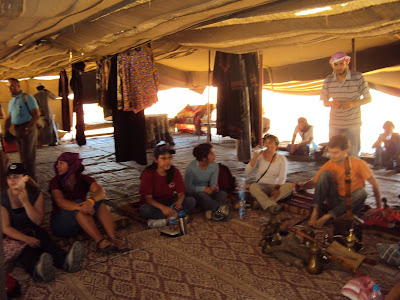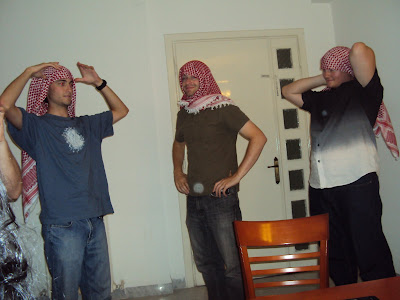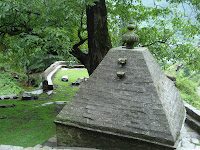My research made it pretty clear that this practice has absolutely nothing to do with the teachings of Islam. Study of Qur'anic verses as well as the Hadith makes it clear that Islam categorically prohibits murder and that God only places the burden of dishonor on the person who has sinned and no one else. Every Muslim organization I could find also condemned the practice, including the Muslim brotherhood.
But yet, the practice continues. Most of the perpetrators admit that they knew they were going against their religion when they committed the crime. But ideas about honor and revenge and pride are so deeply rooted in tradition, particularly here in Jordan that not only is a man able to kill his sister for being handed a strangers phone number, but the law- made by mostly powerful tribal leaders, allows him to do so. Its a problem, one that Jordanians are discussing more often now that human rights organizations and the queen herself are challenging the laws that provide impunity for honor murderers.
Anyway, its finals, so I don't have a lot of time, but here's a really interesting article I found about one of those discussions. It does a good job of not taking the "hardline western media here to point out all the problems in the barbaric eastern world" perspective and actually reporting on the problem as it exists in the Jordanian context. So, in the interests of time and my grades I'm going to steal someone elses reporting and post the story below.
All my love,
Caddie
Queen Rania of Jordan takes on hardliners over honour killings
Queen Rania of Jordan is challenging Islamic hardliners by supporting tougher sentences for men who commit 'honour killings'.
On one side is the fashionably dressed Queen Rania of Jordan, an elegant symbol of progressive values for Arab women. On the other are her country's conservative social and religious leaders.
At stake is a political test case for reform in the Middle East, one that pits demands for greater democracy against the need to end the scandal of so-called honour killings of women.
Queen Rania, who regularly appears without head-scarf, let alone hijab, has given her quiet support to women's rights groups who want to change laws amounting to legal impunity for men involved in honour killings.
But standing against is are another symbol of the country's attempts to show a progressive face. Jordan's MPs, who have been given more power to hold the government and royal family to account than in other Arab countries, have shown little enthusiasm for the moves.
"This whole issue is being exaggerated, and the reason behind it is not innocent," said Sheikh Hamza Mansour, leader of the parliament's Islamic Action Front. His coalition of Islamist and tribal representatives has so far blocked an attempt to introduce tougher sentences for men who have killed their sisters and daughters for bringing "shame" on their families.
"It's as if the government is giving up our personality to turn us into a Westernised society," he said.
The practice of honour killing is more often associated with impoverished and remote areas of countries like Pakistan than cities like Amman, Jordan's sophisticated and Westernised capital.
But it was in Amman's outskirts that Abu Ishmael and his three brothers recently picked up their sister after a call from her husband, took her home, and stabbed her to death.
The squalour surrounding her home in al-Baq'a, where third-generation Palestinian refugee families live in slum-like conditions and where drug-taking and other social problems are rife, is a breeding ground for domestic violence. Pressure to conform to traditional customs is also strong.
When Abu Ishmael and his brothers arrived at their sister's house, they were greeted by catcalls from her relatives, goading them to carry out the killing. "Are you men?" they shouted. "Show us you are men."
The brothers knew what they were expected to do. They bundled their sister into the back of their van, and drove her home in silence.
Within half an hour, she was dead. When her body was handed over to the police, it had 28 stab wounds, including a fatal blow to her heart.
Abu Ishmael insists he had nothing to do with the killing - he was, he says, still outside the door when it happened. The police have arrested two of his brothers.
"I was angry with her," Abu Ishmael told The Sunday Telegraph as he sat in his lawyer's office. "I looked at her in the rear-view mirror as I drove. She said nothing, but she had a barbarous look."
His sister's crime was simple. Her husband complained that she had left the house on the middle of the night carrying her 16-month-old baby son. The police had found her wandering the streets half an hour later.
The dishonour such wanton behaviour brought on her own family, it seemed, could only be expunged by her death.
The sister, a mother of eight though aged just 37, thus became one of an estimated 5,000 women worldwide who will die this year in the name of honour, with their killers likely to face little if any punishment.
Jordan may be a Bedouin society, home to a royal family portrayed in romantic fashion as Peter O'Toole's allies in the film Lawrence of Arabia. But it is now home to more human rights groups and luxury hotels than tents and camels.
King Abdullah, Rania's husband for 16 years, trained at Sandhurst and is said to speak better English than Arabic. The queen regularly appears in glossy celebrity magazines, and is one of the world's best-known users of Twitter, updating followers with details of the latest Hollywood "chick-flicks" she has watched with her children.
For her, it is deeply offensive that the killing of women not only appears to be condoned, but seems to be on the rise: the number of deaths reported, currently between 20 and 25 a year, is increasing.
Sentences remain low, often as little as six months to three years in jail.
The government is introducing a special tribunal to hear honour killing cases, but a parliamentary alliance has so far blocked attempts to change two articles of the legal code. The first is article 340, which allows an "in flagrante" defence to a man who kills his wife and her lover if he finds them in bed together. It has only ever been used once. More important is article 98, a "crime of passion" defence, which is commonly used and gives reduced sentences to those who claim they commit violence in the fury of the moment.
The government wants a minimum penalty of five years even under this defence, but is coming under vociferous attack.
"We are not for taking the law into your own hands," said Sheikh Hamza, an affable, white-bearded man who is among the government's more measured critics. He insists that Sharia, or Islamic law, does not support honour killings.
"But we believe there are political forces which stand behind this issue, and they are trying to destroy the family."
Social researchers say that honour killings are mostly carried out in the poorer, more conservative parts of Jordanian society and in those at its margins. Those include Palestinian families living in semi-permanent refugee camps, like Abu Ishmael's sister.
The issue has risen up the political agenda for more than a decade, ever since a woman journalist named Rana Husseini started reporting what had previously been a taboo subject.
The "dishonour" involved was not just committing adultery, or having a secret boyfriend. Women have been attacked for talking to a stranger; in January, a 13-year-old girl was killed by her 17-year-old brother because she had been given a piece of paper with a phone number on it.
In the most seemingly outrageous cases, women who have been raped by relatives - cousins, or in one case a brother - are killed by the family, while the rapist is left unharmed, since the dishonour is felt to be attached to the woman. Most recently, in August, a 16-year-old girl who became pregnant after being raped by her cousin was allegedly killed by the cousin's father.
A study has found that nearly all the perpetrators questioned were aware that what they had done was a breach of Islamic as well as state law.
Researchers found that families often forced the weakest or youngest brother to carry out the killing, so he would be most likely to get a reduced sentence.
Abu Ishmael said the pressure from the brother-in-law's family was "so great". Unlike many of those questioned in the study, he said he is full of remorse.
Police inquiries have revealed his sister's husband had not told the brothers the entire truth. They allege he had beaten his wife severely with his belt, and then kicked her out. He only called for help when he realised she had taken his baby son with her.
Yet Abu Ishmael does not appear angry. Instead, the whole business remains to him a matter-of-fact quandary, one he seemed to think that any family might face, when addressing the competing possibilities of family disgrace.
"If she really had left the house of her own free will she would have deserved what happened to her," he said, with a sad shake of his head. "But it appears not."

































